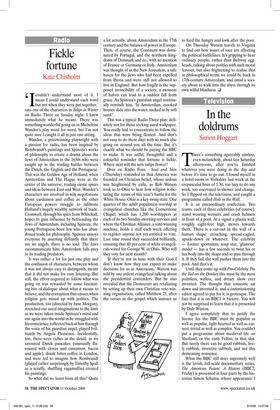Fickle fortune
Kate Chisholm
‘I couldn’t understand most of it. I mean I could understand each word but not when they were put together,’ says one of the characters in Tulips in Winter on Radio Three on Sunday night. I knew immediately what he meant. There was something wonderful going on in Michelene Wandor’s play word for word, but I’m not quite sure I caught it all in just one sitting.
Wandor, a prizewinning playwright with a passion for radio, has been inspired by Rembrandt’s paintings and Spinoza’s works of philosophy to create a drama about the Jews of Amsterdam in the 1650s who were caught up in the trading battles between the Dutch, the English and the Portuguese. This was the Golden Age of Holland; when Amsterdam and The Hague were at the centre of the universe, trading exotic spices and ideas between East and West. Wandor’s characters are involved in wily negotiations about cardamon and coffee as the other European powers struggle to infiltrate Holland’s hugely wealthy network of trade. Cromwell, through his spies from Whitehall, hopes to gain influence by befriending the Jews of Amsterdam, including Spinoza, the young Portuguese-born Jew who has abandoned trade for philosophy. Spinoza annoys everyone by asserting defiantly that there are no angels, there is no soul. The Jews excommunicate him; Amsterdam falls prey to its trading predators.
It was rather a lot for just one play and the confusion of characters, between whom it was not always easy to distinguish, meant that it did not make for easy listening. But still, the effort required to follow what was going on was rewarded by some fascinating bits of dialogue about what it means to believe, and the corruption that ensues when religion gets mixed up with politics. The production, too (directed by Jane Morgan), stretched our aural imaginations to the limit as we were taken inside Spinoza’s mind and out again into the world as he struggled with his conscience, reflected back at him through the voice of his guardian angel, played brilliantly by Angela Pleasence. Incidentally, too, there were riches in the detail, as we savoured Dutch pancakes (unusually flavoured with cloves and cinnamon, bacon and apple), drank bitter coffee in London, and were led to imagine how Rembrandt (played rather surprisingly by Timothy Spall as a scruffy, shuffling ragamuffin) created his paintings.
So what did we learn from all this? Quite a lot actually, about Amsterdam in the 17th century and the balance of power in Europe. Then, of course, the Continent was dominated by Portugal, and the northern kingdoms of Denmark and co., with no mention of France or Germany or Italy. Amsterdam was thought of as the New Jerusalem, a safe haven for the Jews who had been expelled from Iberia and were still not allowed to live in England. But how fragile is the supposed invincibility of a society; a moment of hubris can lead to a sudden fall from grace. As Spinoza’s guardian angel continually reminds him, ‘In Amsterdam, crooked houses slide into the water, sucked in by soft sand.’ This was a typical Radio Three play; definitely not for those seeking aural wallpaper. You really had to concentrate to follow the ideas that were being floated. And that’s not easy to do these days with so much else going on around you all the time. But it’s exactly what we should be paying the BBC to make. It was artful, thoughtful and a colourful reminder that fortune is fickle. Where next will the new tulips flower?
Over on Radio Four, Soul and Skin (Thursday) reminded us that America was founded on Christian belief, whose ardour was heightened by exile, as Rob Watson took us to Ohio to hear how religion is dictating the terms of this year’s battle for the White House. Ohio is a key swing state. One quarter of the adult population worship at evangelical churches like the Cornerstone Chapel, which has 1,200 worshippers at each of its two Sunday-morning services and where the Christian Alliance, a vote-winning machine, holds a stall each week offering to register anyone not yet entitled to vote. Last time round they succeeded brilliantly, ensuring that 80 per cent of white evangelicals voted for George W. in Ohio. Who will they vote for next month?
‘If they’re not in tune with their God I don’t know how they can expect to make decisions for us as Americans,’ Watson was told by one ardent evangelical talking about the presidential contenders. But he also revealed that the Democrats are retaliating by setting up their own Christian vote-winning organisation, called Matthew 25, after the verses in the gospel which instruct us to feed the hungry and look after the poor.
On Thursday Watson travels to Virginia to find out how issues of race are affecting the political battlelines. It’s gripping to hear ordinary people, rather than Beltway eggheads, talking about politics with such moral fervour, but also frightening to realise that in philosophical terms we could be back in 17th-century Amsterdam, and amid a society about to walk into the abyss through its own wilful blindness. ❑










































































 Previous page
Previous page